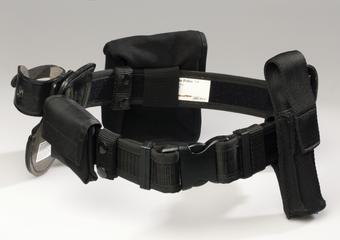
Clear-Therm 3 heat moisture exchanging (HME) filter
- Made:
- 2020 in United Kingdom




Clear-Therm 3 heat moisture exchanging (HME) filter, used to create prototype reusable emergency personal protective equipment (PPE) during the first wave of the COVID-19 pandemic in Europe, Intersurgical, UK, 2020
This heat moisture exchanging (HME) filter was used together with a 3D-printed adaptor to convert a full-face snorkel mask into a prototype form of reusable emergency personal protective equipment (PPE) during the first wave of the COVID-19 pandemic in Europe. The mask creates a tight seal around the face and was designed to enable the user to inhale via the snorkel element and exhale through a separate channel to prevent the visor from fogging. The HME filter was attached to the snorkel element via the adaptor, greatly reducing the risk of airborne transmission of COVID-19 from patients to healthcare practitioners. The idea was that, at the end of each use, the mask and adaptor could be cleaned and the disposable filter changed ready for reuse.
The project was initiated by a Sussex-based maker group working with a local consultant anaesthetist, who together refined a design for an adaptor created in mainland Europe to make it easier to print and clean. Two variants were created by the team to work with the majority of snorkel masks on the market. A local appeal shared on social media resulted in a donation of 400 masks from sports stockists and members of the public, which were then cleaned and prepared by volunteers from Brighton College. The new design was tested in a simulated working environment and further validated by researchers from Stanford University.
While PPE needed to be rationed and reused in the UK to ensure supplies did not run out at the initial peak of the crisis, these adapted masks were never used. Similar versions were used to provide emergency protection to staff working in Italian, French, Belgium and Spanish hospitals, and 150 of these units were dispatched to hospitals in Zambia.
Details
- Category:
- Public Health & Hygiene
- Object Number:
- 2021-628
- Materials:
- plastic (unidentified)
- Measurements:
-
overall: 40 mm 50 mm,
- type:
- filter
- copyright:
- Intersurgical




